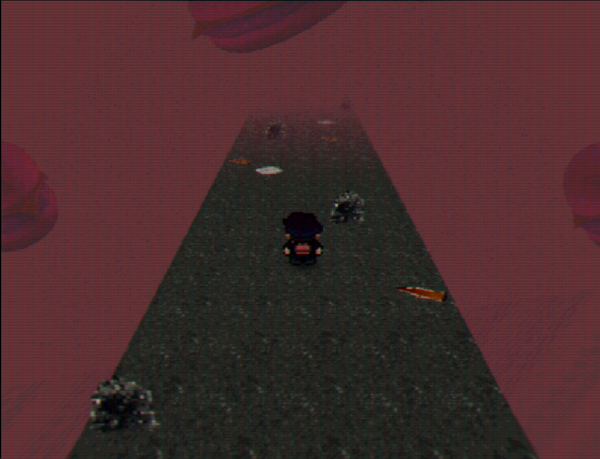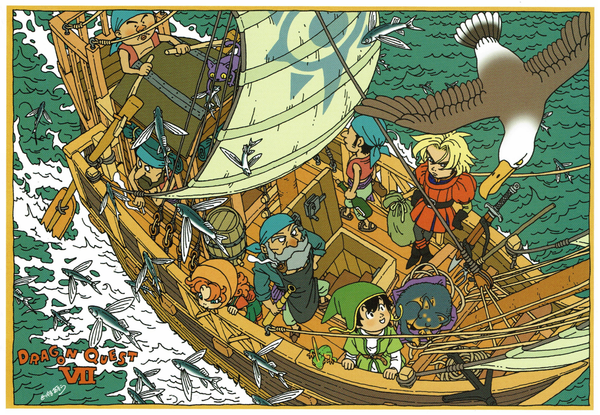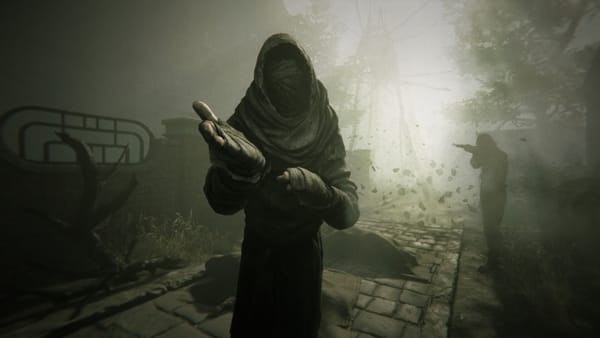Final Fantasy Tactics Memes Prove Video Games are Art
Final Fantasy Tactics memes engage audiences in an unique form of reader-response.
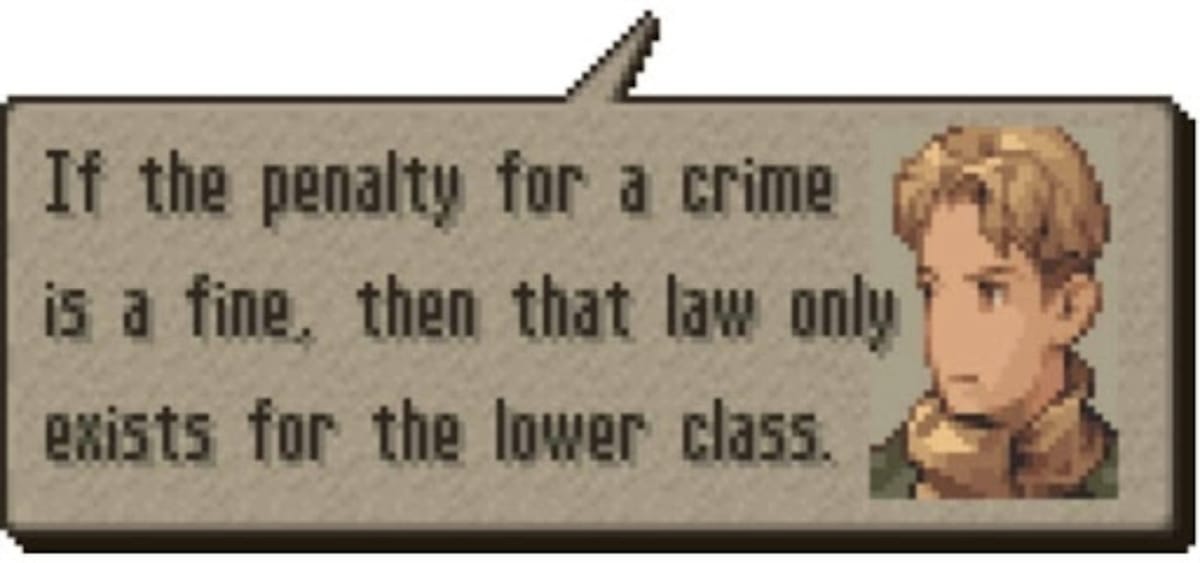
It’s no easy task to determine Final Fantasy Tactics’ most memorable character. The game is filled with nuanced, compelling figures, including protagonist Ramza Beoulve and anti-hero Delita Heiral, two friends who, because of their circumstances, take different approaches to battling injustices in a war-torn land. What’s much easier to pinpoint is the game’s most memorable line of dialogue: “If the penalty for a crime is a fine, then that law only exists for the lower class.” This line is so well-known that even people who never played the game can recite the quotation, and those “in the know” can credit its source.
The words are spoken by Wiegraf Folles, another one of Final Fantasy Tactics’ distinctive characters. His tragic backstory and the increasingly questionable decisions he makes to try to improve the state of the world make him stand out among the game’s numerous secondary antagonists. But it’s not just the story that elevates Wiegraf: he’s widely considered the hardest boss in the game. What’s worse is that his battle is part of a series of fights that can softlock unsuspecting players. There’s no way to escape the battlegrounds once entered, leaving anyone who’s under-prepared with no way to further strengthen their party.
As famous as this character and his dialogue is, though, no one can pinpoint where he says it in the game. As an exploited, unpaid soldier of a previous war, Wiegraf has plenty of reason to say that laws with fines for penalties only affect the lower class. Still, it doesn’t quite fit into any of his infamous scenes or battles.
This is because it isn’t real dialogue from Final Fantasy Tactics.
The saying comes from a fan-made image of a Final Fantasy Tactics speech bubble with Wiegraf’s face and the quotation in question. It’s on a blank background, unattached to any scene from the game. This should be the first clue that the image, and thus the dialogue, doesn’t come from the game. Yet the picture, first published on Facebook in 2020, exploded in popularity, reaching far beyond the creator’s circle of friends. The image’s maker took the opportunity to create the account “Leftist Gamer Memes” specifically to spread their fan-made images, and is still making memes today.
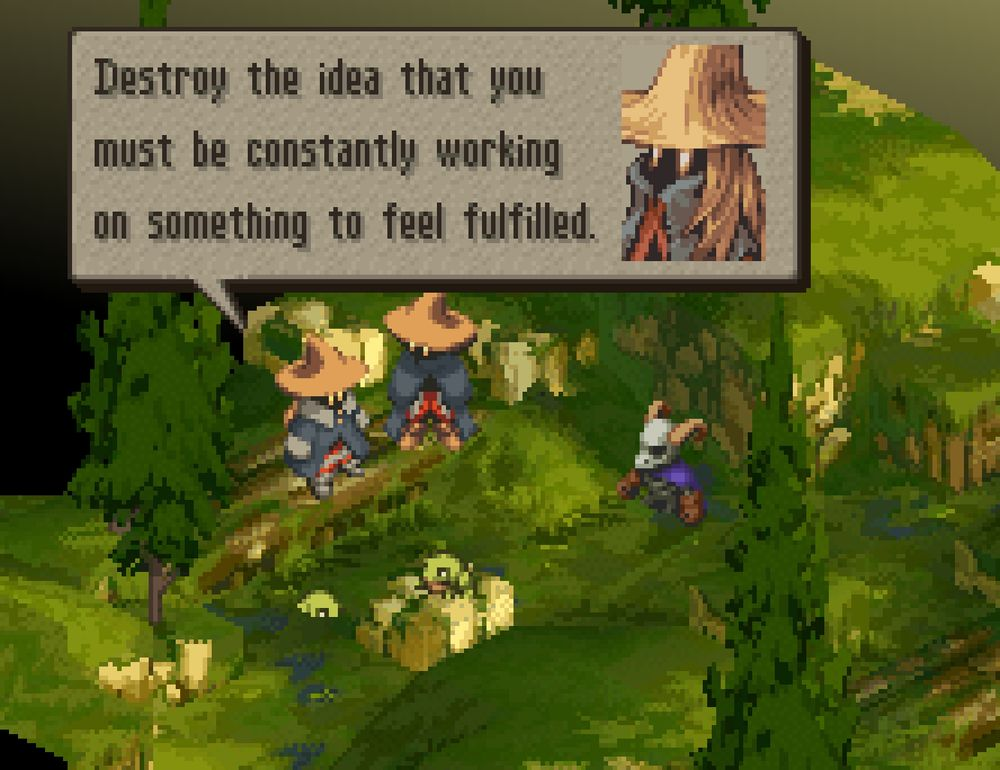
Leftist Gamer Memes’ works all share a similar underlying, leftist tone, but the Wiegraf meme is unique. Although it’s possible, with a little digging, to confirm that the dialogue is fan-made, the meme spread uncontrollably, to the point where it’s widely believed to be from the actual game. It isn’t uncommon to find numerous people responding with “Final Fantasy Tactics” whenever someone on Reddit asks about the quote’s origins.
What makes this situation so odd is that the meme is from 2020, when information was already being thoroughly archived online. It’s possible to find entire playthroughs of games like Final Fantasy Tactics uploaded onto YouTube, and the entire script of the War of the Lions edition of the game is on the Final Fantasy Wiki. The misunderstanding over the Wiegraf meme’s legitimacy would be more understandable if it was from the early 2000s and prior, when the internet was one big playground for unsubstantiated rumors, like catching the Pokémon Mew under a truck in Red and Blue Versions or unlocking Luigi as a playable character in Super Mario 64. And these rumors are now recognized as such, not as actual features of their associated games. Why did the meme of Wiegraf, of all things, spread and “become” a line of dialogue from Final Fantasy Tactics?
It’s partially due to word of mouth. Streamers with substantial follower counts shared the image and credited it to Final Fantasy Tactics, quickly spreading the idea to large audiences. But their audiences wouldn’t have been so quick to believe what they were hearing if the dialogue in the meme didn’t seem accurate to the source material. The creator of Leftist Gamer Memes, who prefers to be referred to by the account’s name, spoke to Aftermath on the topic in 2023: “I think people want to believe [the quote comes from FFT] because of the inherent nature of the story and characters in that game.”
This statement rings true. Final Fantasy Tactics is, at its core, about how political conflicts among the nobility affect the lower classes disproportionately. The theme is so prevalent that, even though Ramza’s intentions are always just, his actions at the start of the game inadvertently harm innocent people, causing him to question his allegiances and beliefs.
It’s possible, then, that the meme’s real origins lie in a misremembering. Maybe there’s dialogue in Final Fantasy Tactics that resembles the meme, but Leftist Gamer Memes forgot the exact wording and who said it. That seems to be what they believe, because while streaming the game on January 2024, they came across what they describe as the “line … that fooled everyone.”
Dycedarg, another one of the game’s secondary antagonists, asks his brother Ramza, “What purpose do laws serve when even those who would enforce them choose not to pay them heed?” Like Wiegraf, Dycedarg’s choices lead him down a path of ruin, despite his willingness to question the nobility’s privileges that could have made him a strong ally under different circumstances. Nathan Grayson, who interviewed Leftist Gamer Memes for Aftermath only a few months prior to this “discovery,” describes the in-game line as “nearly a dead ringer for the meme quote[.]” It’s a sensible mix-up, considering how drastically the mind can warp memories over time.
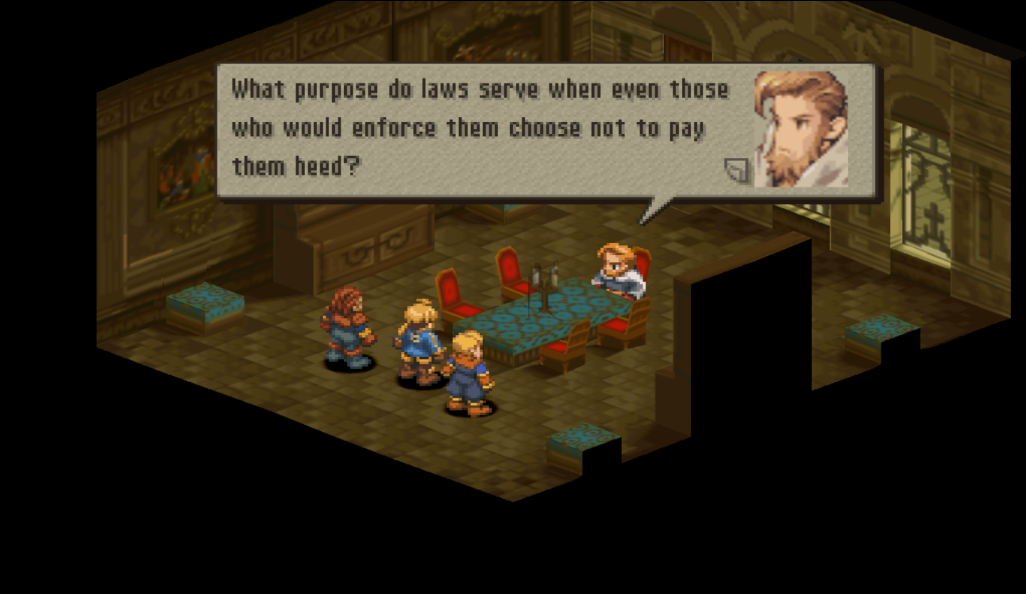
“So there you go, there’s the missing piece of the puzzle. Case closed,” says Grayson—but as the historian Arazlam says at the start of Final Fantasy Tactics, “what the eye sees is oftentimes a mere fragment of the truth.”
When a Final Fantasy Tactics remaster was announced in June 2025, fans were hyped. And with hype comes internet posts, including plenty of memes. The Wiegraf meme got a lot of mileage after the announcement, prompting people to respond not just to the game, but to the meme itself.
Like all art, peoples’ responses to memes will differ based on a variety of factors, including the individual’s familiarity with the source material or their opinion of the “message.” Sometimes these responses can be humorous, such as an image reading, “Huge Final Fantasy Tactics Meme Poster Excited to Play It for First Time.” Because of how quickly memes spread, it’s not uncommon for them to be shared among and by people who are unaware of the source material. But this particular image comes with the implication that anyone who posts or even creates Final Fantasy Tactics memes didn’t play the game. This further suggests that either everyone must have an impossibly perfect memory to recognize that the dialogue wasn’t in the game exactly as is written in the meme, or that the memes are thematically inaccurate to the source material, and anyone who played the game would be able to recognize them as “fake.”
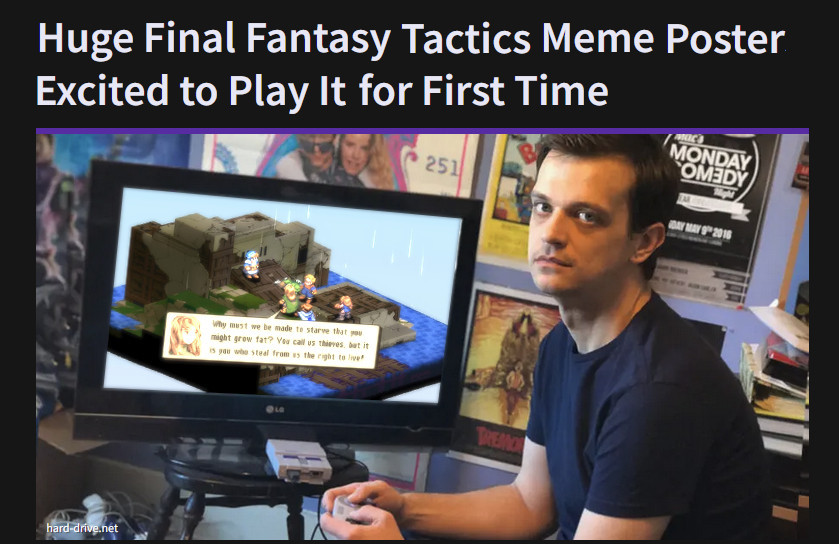
This isn’t the case with Leftist Gamer Memes, who crafted the Wiegraf meme with careful consideration for the game’s characters and messages. Even the most simple memes are created with a combination of details, each serving an important purpose. From the meme’s medium to what the meme depicts, whether it’s “in-character” or subverting the audience’s expectations, there are endless possibilities to keep in mind.
As it turns out, Leftist Gamer Memes was considering similar factors when making the Wiegraf meme. Even though the writing feels similar to dialogue present in the game, it’s altered to more specifically align with Wiegraf’s political leanings. The people who did play Final Fantasy Tactics will have a strong reaction to him because of his association with the game’s “difficulty spikes.” As Leftist Gamer Memes explains to Aftermath: “If you’ve played the game at all, it’s hard to shake the memory of his face.”
Even memes that are “just supposed to be funny” require an understanding of the source material on some level. In a different meme depicting Wiegraf, he says, “hey dipshit, I hope you’ve been using more than one save slot” in reference to how players without multiple save files are more susceptible to getting softlocked during his notorious chain of battles. This quotation is so absurdly out of character as to derive its humor from the fact that it’s obviously not real, but it is still in conversation with the original work. As Adam Aleksic, otherwise known as etymology_nerd, explains in his aptly titled short video, “It’s always that deep,” “Things are funny for a reason. … humor is entirely socially constructed. Things are only funny because you have this built up idea of what qualifies as ‘funny.’ Humor is not arbitrary or inherent.”
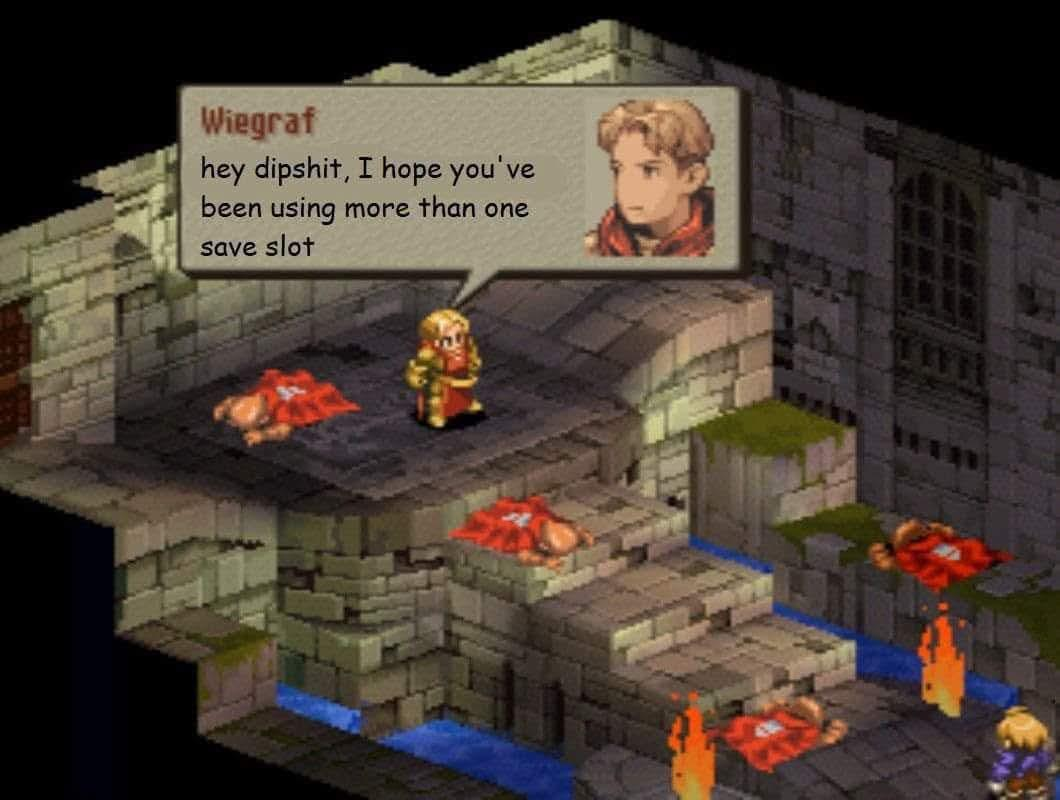
This is why it feels so conflicting whenever someone says that the people who “attribut[e] fake ass quotes to Final Fantasy Tactics … did NOT play that game[.]” While anyone can enjoy a meme on its own, in the end, the people who get the most out of images like the Wiegraf meme are the ones who did play Tactics. The creation of the Wiegraf meme, and the subsequent sharing of it, shows an understanding of the game’s basic themes and values. Not the game’s deeper themes, but its basic themes, because in the case of Final Fantasy Tactics, these ideas aren’t hidden under layers of subtext. They’re on the surface as the text.
Final Fantasy Tactics writer and editor Yasumi Matsuno agrees.
Matsuno wrote a powerful message for the official Final Fantasy series Twitter account as part of the Tactics remaster announcement. It discusses how Japan’s economic collapse of the 1990s inspired the story of Ramza fighting “tirelessly against the entrenched social class system.” The message ends with the striking words: “And now, in 2025—a time when inequality and division are still deeply rooted in our society—I offer this story once again. The will to resist is in your hands.”
With its clear ties to politics, Ethan Gach wrote a news article about the message for Kotaku titled “The Director Of Final Fantasy Tactics Gets Political.” In it, Gach makes reference to the famous Wiegraf meme, stating that Tactics “has given rise to all sorts of memes about political radicalization” which “felt so aligned with the core theses of the game that people just started pretending like they were actually from the game.” While “pretending” might not be the exact connotation relevant to the Wiegraf meme situation, it’s true that it is still wrongly attributed to the game to this day.
The most surprising aspect of this story is that Matsuno responded to it a few days after it was published. On June 7, 2025, Matsuno wrote on Twitter: “I found the line that became an internet meme interesting. … Of course, this line was not written by me, nor is it a line in Final Fantasy Tactics. However, it certainly sounds like something I would have written. It’s a shame I didn’t know about this funny line until today.”
Whether or not the people who make or share memes such as the Wiegraf meme played Tactics or not, they’ve created dialogue with the source material that reveals what should be an obvious but still highly relevant truth about the game’s ideas. In this way, they serve as a form of art criticism or analysis.
Memes might not look like art criticism at first glance, but they don't need to take the usual “shape” associated with criticism, just like how video games are a convergence of multiple art forms, including storytelling, visual art, and music. As communication continues to evolve, incorporating visual elements such as emoji, memes worm their way into the picture and influence the way people communicate. They stand as a valid form of art that can be used as art criticism just as video games stand as an art form.
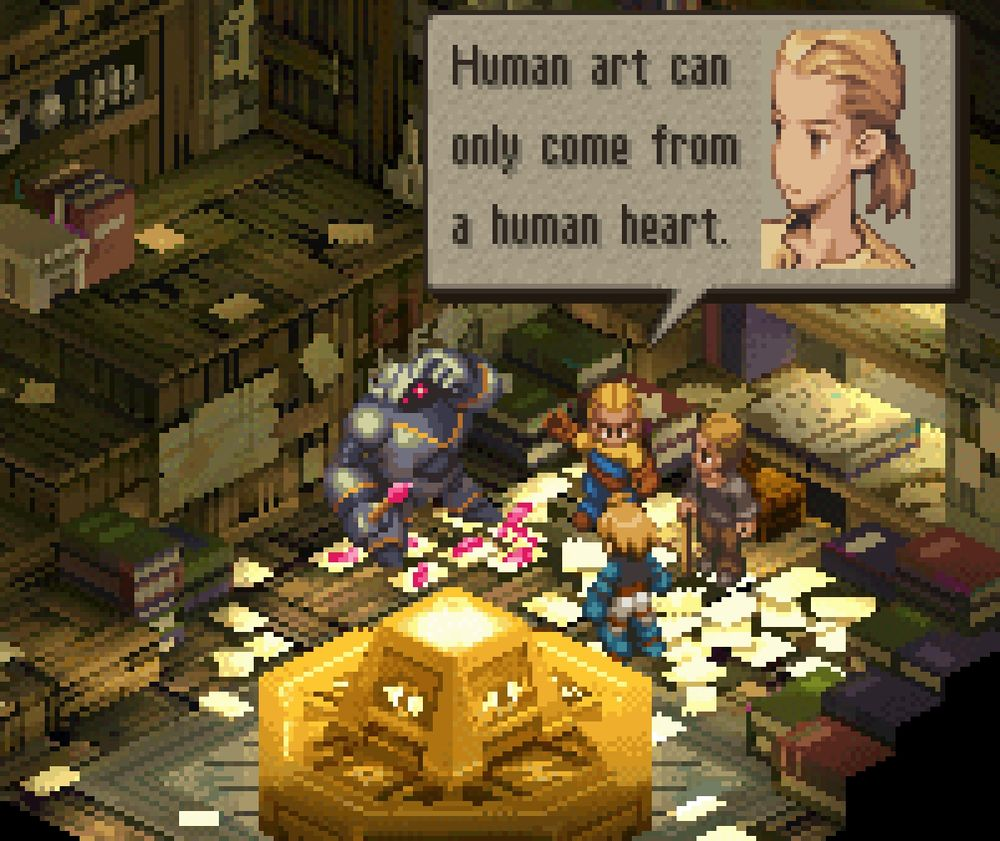
It may be tempting to dismiss this idea because of the recency of both video games and memes. Because capitalism has helped expedite the transformation of art into product and thus dissolved much of the curation that is associated with art, video games are usually considered product before art form. And memes are just silly things people make for laughs. But things don’t need to be in a museum to be considered art. The way the meme-maker and meme audience interact with memes in regard to their source material is reminiscent of reader-response theory, a school of theory that posits that any work’s deeper meaning comes just as much from the audience’s responses as it does from its creator’s intentions.
Final Fantasy Tactics lucked out in that its most famous meme aligns with the author’s “intent” for the work, as confirmed by the author himself. But it doesn’t have to always align completely. Audiences can get an even more thorough reading of a work by combining the post-structuralist ideas of reader-response theory with structuralist ideas, considering the context of the art and the artist in addition to the audience’s own personal experiences. The artist, like the meme-maker, is the one who made the decisions that led to the art’s existence in the first place. It’s not possible to remove them from the equation completely. But the audience is just as much a part of that equation. As YouTube user Professor Bopper states in his video essay “The Curtains Are Not Blue: How Capitalism Harms Art,” “All art is a two-way conversation between viewer and text.” The audience and the art are each “full vessels being mixed and forced to converse between one another.”
That conversation is the key that unlocks deeper meaning in media and transforms it into art. Video games are art, they can be criticism, and they can be a form of resistance. The same is true of memes. As Matsuno says, “The will to resist is in your hands.” Use them to play video games with meaning, use them to bring the games to life with your own meaning—or use them to make some memes.
Stop Caring is reader supported and 100% free. Please consider subscribing or making a one-time donation to make more of this possible. All donations on this article go directly to the author.

